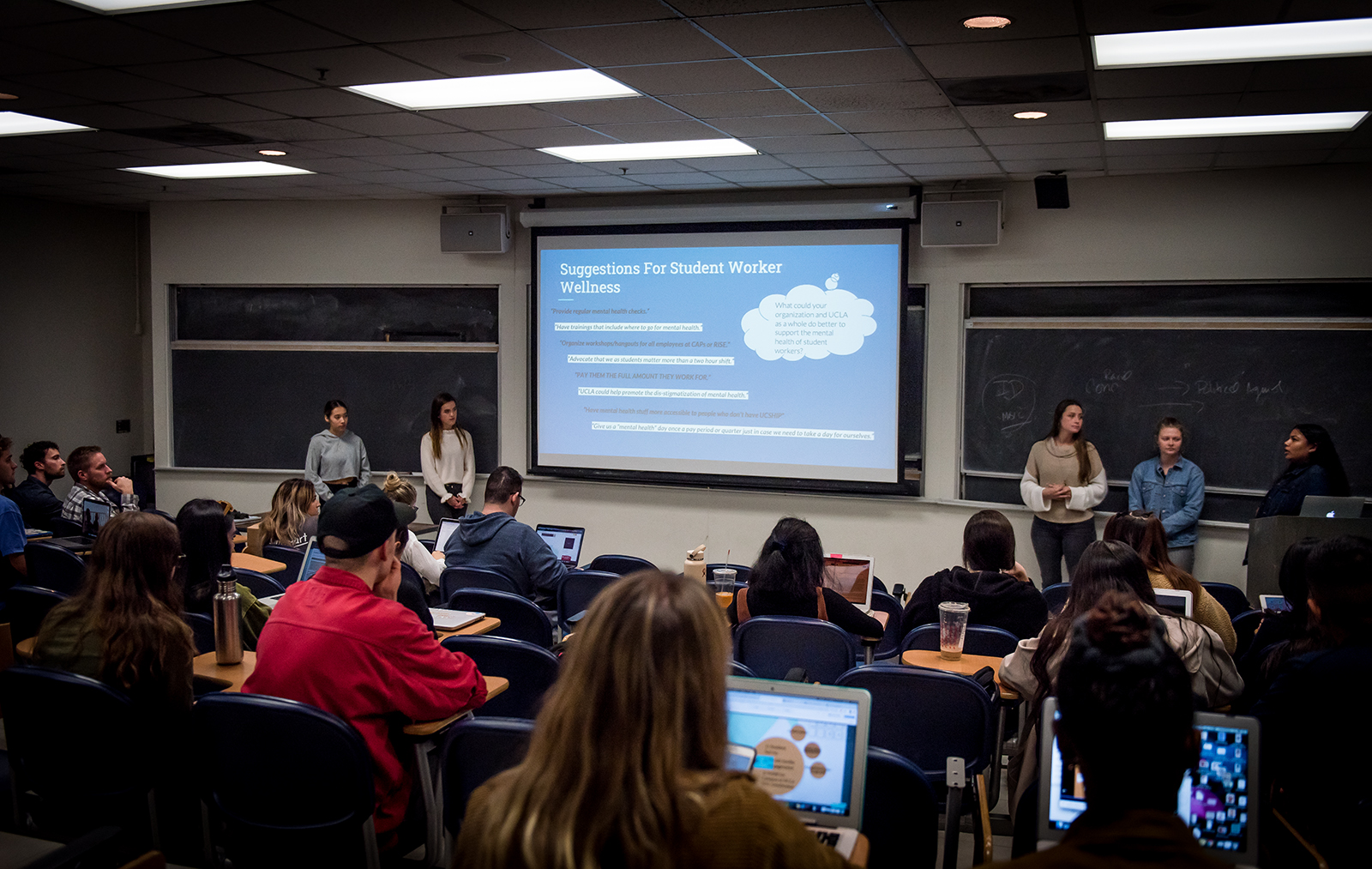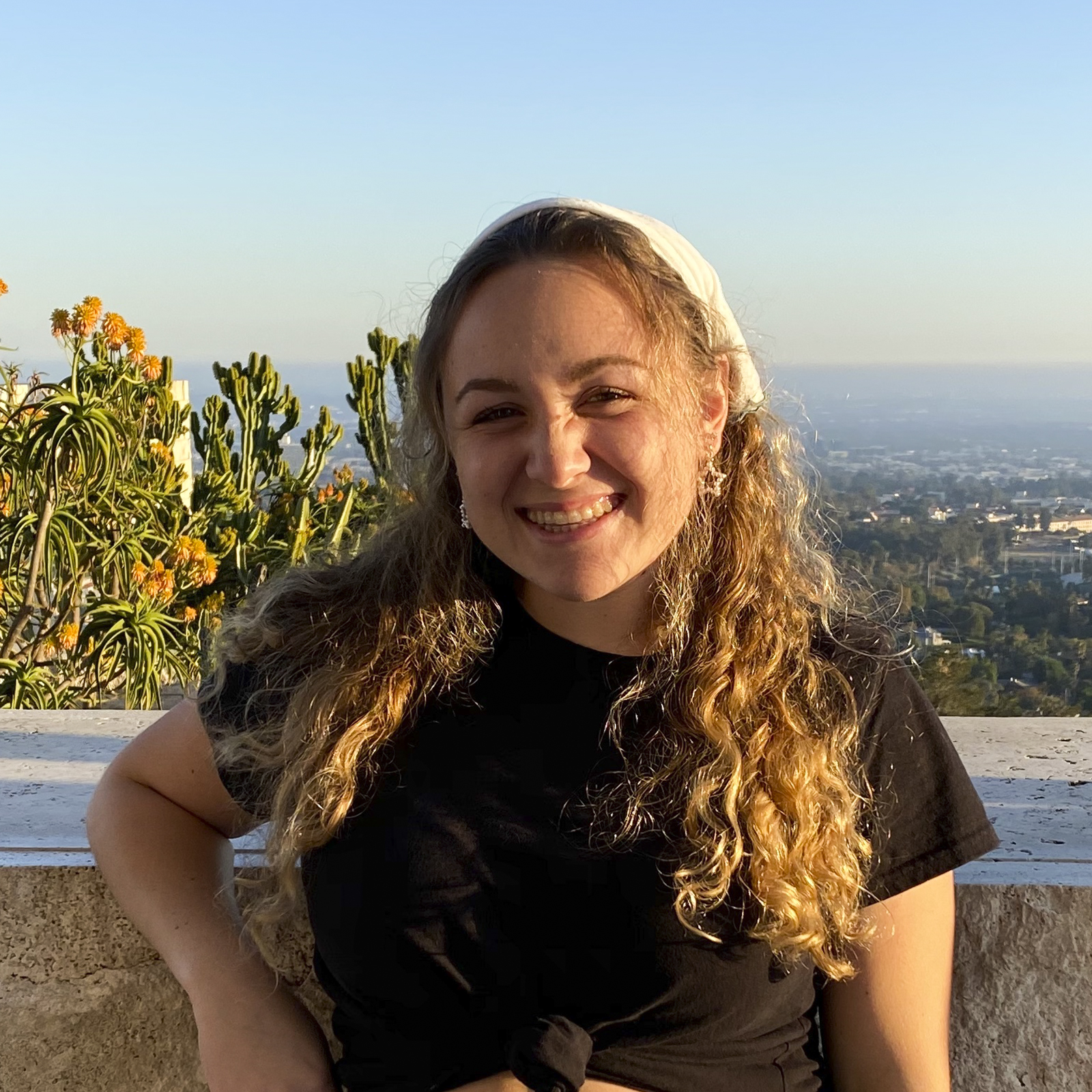Student class projects aim to raise awareness of UCLA’s mental health resources

Chris Schottmiller’s disabilities studies class presented projects devoted to raising awareness of mental health resources on campus. During the course of their projects, students conducted surveys and wrote newsletters, among other things. (Kanishka Mehra/Assistant Photo editor)

By Kaitlin Browne
Jan. 5, 2020 11:29 p.m.
When Carl Schottmiller, a disabilities studies professor, took a training hosted by UCLA’s Resilience in the Student Experience Center over the summer, he realized how little he knew about UCLA’s mental health resources.
It was these trainings that inspired Schottmiller to tweak his class, Disability Studies M148: “The Sociology of Mental Illness,” to create a dialogue about UCLA’s own mental health resources. The course looks at mental health through a sociological lens and examines the mental health crisis on college campuses.
For the first five weeks of class, Schottmiller taught about the resources available on campus and held class discussions. Students were then tasked with brainstorming ideas for a project of their choice that could reach students on campus and publicize the campus’ mental health resources.
The students’ midterms were their project proposals. After feedback, the second half of the quarter became work time for their projects, Schottmiller said.
Schottmiller said he wanted these projects to be student-oriented because he believes that students are fundamental in creating a larger conversation about mental health on campus.
“To me, that is part of the process of civic engagement that’s so important to actually address this issue on campus,” Schottmiller said. “We need student-centered projects to really get at the heart of how we can best support students.”
Teams of five or six students presented projects over the course of finals week, with proposals ranging from Tumblr pages to advertisements on coffee sleeves to a mental health general education requirement.
The groups then had to find a way to gain a larger outreach for their projects by reaching out to other UCLA organizations.
Some of the students pitched their projects to the MindWell pod, a Semel Healthy Campus Initiative Center program aimed at promoting general wellness. Others shared their resources and projects with Counseling and Psychological Services and RISE, or other mental health organizations that could be advertised on their proposed platforms.
Brittany Moll, a third-year sociology student who took the class, and her group decided to focus on the wellness of Associated Students UCLA student workers. Moll said they decided to focus on the idea because many of their group members were student workers themselves.
“We targeted UCLA student workers because we know that students who work generally have to balance more, with work, social life, academics and everything,” Moll said. “Our goal was to really make student workers aware of the resources on campus that were supplied to their concerns and needs.”
The group surveyed student workers about their knowledge of UCLA’s mental health resources. As a supervisor at UCLA BookZone, Moll was able to contact the CEO of ASUCLA, who expressed interest in their project and offered a $25 incentive to workers who filled out the survey.
The survey received 204 responses. The group then created a newsletter to send out to student workers that publicized mental health resources that could address student workers’ concerns about finances, academics, health and the environment, all of which are areas of need the workers identified in the survey.
Their survey also found that although 83% of student workers said they had experienced mental distress, 75% said they never sought treatment or help. Moll said this demonstrates that despite high rates of mental distress, many students still feel uncomfortable reaching out.
Student workers also said in the survey that they felt that going to resources such as CAPS felt like a last resort. This stigma is what group member Carmen Palacios, a fourth-year psychology student, wanted to focus on and change the most during their project.
“We want to … let students know that other students are actually experiencing these issues too, and that we all need to come together and figure out a better solution because most of the people that did report being aware of resources didn’t seek help through those resources, and those who did seek help felt that it wasn’t good help and that it was only a thing to do only when you are in crisis instead of when you needed a daily assistance kind of situation,” Palacios said.
Like Schottmiller, Palacios felt that an emphasis on student-led projects for these mental health issues was crucial in bringing change faster.
“As students, we are the only ones who know what we are going through,” Palacios said. “We can all relate to each other and our struggle. When we come together and talk about the issues we are having, we kind of destigmatize (getting help).”
Serenna Simeon, a third-year sociology student in the class, said she felt that projects like these were important because of how they connect students to making changes in their communities.
“I’m really thankful for this class that we are able to get this opportunity to help our community,” Simeon said. “More than just our own in the classroom, but the whole UCLA student body.”


